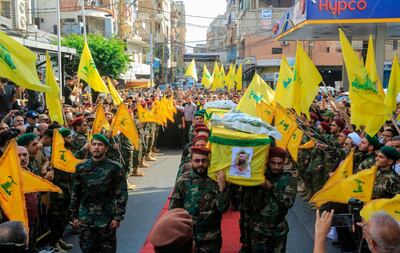Israel's widening campaign against pro-Iran groups in recent weeks, with strikes from Iraq to Lebanon, risks igniting a regional war after Hezbollah vowed to retaliate, analysts said on Monday.
“There is clearly a stepped-up Israeli campaign targeting Iranian assets from the outskirts of Baghdad to the suburbs of Beirut. This is a dangerous escalation that, in Lebanon, seeks to alter the tacit rules of engagement set after the 2006 war,” said Firas Maksad, adjunct professor at George Washington University.
Israel fought its last all-out war with Iran-backed Hezbollah, a group that functions both as a Lebanese political party and as a regional paramilitary force, in the summer of 2006. Since then, Israel has not launched attacks on Lebanese soil unless they were retaliatory raids.
The explosion of a drone near Hezbollah’s media office on Sunday, which the Lebanese army said was of Israeli origin, is the first breach of this unwritten rule, Hezbollah leader Hassan Nasrallah said in a televised speech in the evening.
From now on, Hezbollah would “face Israeli drones in the skies of Lebanon and bring them down”, Mr Nasrallah said.
Such threats were to be expected, Mr Maksad told The National. "It is well understood that the balance of power established [after 2006] is such that such attacks will result in a Hezbollah response. Hence, Israel has been targeting Hezbollah arms convoys in Syria, on the other side of the border."
Hezbollah, the only militia to keep it weapons after Lebanon's 1975-90 civil war, in the name of fighting Israel, sent its forces into Syria in 2013 to help President Bashar Al Assad put down an uprising.
Less than 24 hours after the drone attack, an allied Palestinian group, the Popular Front for the Liberation of Palestine – General Command (PFLP-GC), accused Israel of raiding one of its military compounds near the Syrian border. No casualties were reported.
President Michel Aoun, a Hezbollah ally, described the two Israeli attacks on Lebanon as an “act of war” during a meeting with the UN representative Jan Kubis. He called for an emergency meeting of the Supreme Council of Defense on Tuesday afternoon to discuss the appropriate measures to be taken.
On Monday afternoon, Prime Minister Saad Hariri met the ambassadors of the permanent members of the United Nations Security Council – France, the UK, Russia, China, and the US – and told them Lebanon would lodge a formal complaint to the council.
"Israel clearly violates Lebanese sovereignty and resolution 1701 [adopted after the 2006 war to maintain the cessation of hostilities] and targeted a populated civilian area without regard to international or civilian lives,” Mr Hariri said.
Israel followed its usual policy of not commenting on the incidents.
The state-run National News Agency reported heavier than usual Israeli surveillance flights above the southern cities of Marjayoun and Nabatieh as well as over Baalbek in the Bekaa over the past two days. However, the UN-monitored border between Lebanon and Israel – or Blue Line – had returned to a “cautious calm” after intensified Israeli patrols on Sunday. “Today, the foot and car patrol movements of the enemy have disappeared from the border near Marjayoun, and the enemy’s soldiers are stationed inside their fortified positions along the Blue Line,” NNA reported. Lebanon and Israel are technically at war.
But Hezbollah remained silent on Monday, despite the Israeli attack on the PFLP-GC happening only a few hours after Mr Nasrallah’s angry promises of retaliation.

In addition to attacks on Lebanese soil, an Iran-backed paramilitary force operating on the Syria-Iraq border was also targeted in another alleged Israeli strike on Sunday, one day after Israel said it had struck an Iranian base near Damascus in a pre-emptive attack. Mr Nasrallah disputed this, saying that Israel had actually targeted his fighters. Two of them were killed.
Mr Nasrallah made similar threats of retaliation last month, saying that Hezbollah would strike at Israel should it assassinate any of his men in Syria. Mr Maksad said Hezbollah’s lack of reaction after recent air raids is proof that “Israel is calling his bluff and his credibility is on the line”.
Lebanese analyst Samir Hassan, who is close to Hezbollah, defended the group, saying it could strike back anytime but probably not immediately.
After the drone incident in Beirut on Sunday, Hezbollah officials were careful to say that the drones had “fallen”, and had not been “taken down”, in an effort to not be accused of inflaming regional tensions.
However, Israel’s change of tactic against Hezbollah is clear, signalling a “new stage” in the Hezbollah-Israel confrontation, said Mr Hassan. “It could take the form of an old-style confrontation, or of drones, or of rocket firing,” he said.
Echoing Mr Nasrallah’s speech, Mr Hassan said that Israel was stepping up pressure on Hezbollah because Prime Minister Benjamin Netanyahu, who is facing corruption charges, wanted to win over voters for the September legislative elections.
Mr Maksad said that it was more a matter of Israel carrying out what it viewed as “a natural response to Iranian encroachment on Israel’s borders”.
Lebanese critics of Hezbollah blamed it for sparking the 2006 war, in which more than 1,000 Lebanese were killed, mostly civilians. Responding to Israel’s increased drone campaign in the region would most probably spark a regional war with devastating consequences for Lebanon, which is also struggling with an economic crisis. “It’s a high stakes game and we don’t know who will blink first,” said Mr Maksad.






